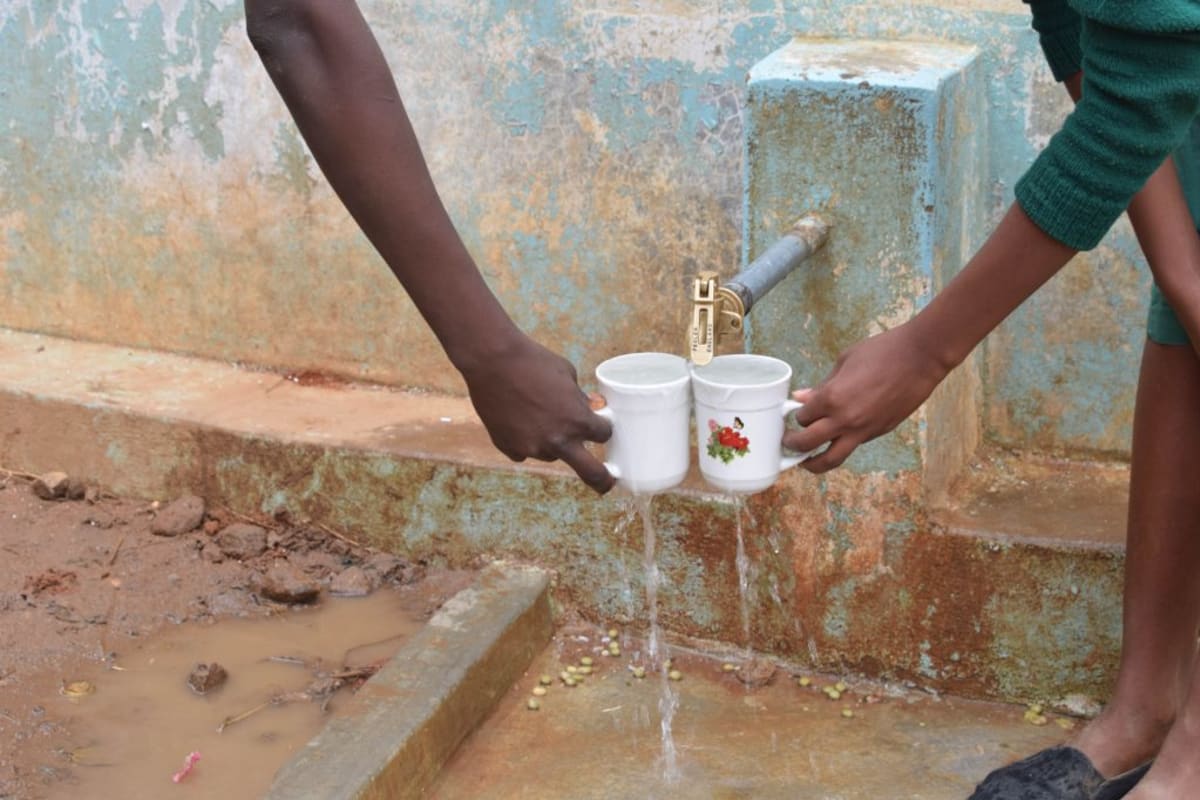This project is a part of our shared program with Africa Sand Dam Foundation. Our team is pleased to directly share the below report (edited for clarity, as needed).
Welcome to the School
Ndwaani Primary School is located in Kambuu, Makueni County. The school was formed in the year 1954. It is a public school that has a population of 259 total, including teachers. The school has been challenged with water scarcity over the last several years.
Ndwaani Primary School is where most of the Twone Mbee Muselele Group sends their children. They applied for a project so that their children wouldn’t have to suffer the bad situation at school any longer.
Water Situation
The school has two plastic water tanks that collect water when it rains. One has a capacity of 10,000 liters and the other is 5,000. The school needs 300 liters of water per day. Because of this requirement, these tanks only last three months after the rainy season. They will not collect water again until the next year's rainy season, forcing students to look elsewhere for water.
The closest water point is River Yandia, which is three kilometers away. To meet the school’s water demands, pupils are required to carry water from home every day. If a student is allowed to attend class, they must have at least five liters of water with them. The school uses this water for cooking, hygiene and sanitation uses e.g. washing of hands, offices, and classrooms. Since the neighborhoods these students come from don’t have a permanent safe water source, it is likely that the water brought to school is not safe for consumption. The lack of water has affected performance of the school due to frequent truancy of students who want to avoid this stress, especially girls.
The water from River Yandia is not protected from contamination. Holes are dug in the ground at the riverbed to fetch water. Alternatively, there is a borehole that is also three kilometers away from which the school buys water from time to time. There are also some local vendors who are paid to fetch water and deliver it to the school.
There have been constant reports of waterborne disease after drinking water at school. This in turn leads to constant absences and poor academic performance. To try and help the dire situation, the school purchases water, but this is a huge expenditure for them.
Sanitation Situation
The water scarcity issue here has also led to poor hygiene practices and a dirty school environment. Classrooms and latrines aren’t cleaned when there isn’t enough water for cooking and drinking.
There are 16 pit latrines on school grounds, but they are filthy and smelly. There are no hand-washing stations for students to wash their hands after the latrine and before eating. There is a little awareness on good hygiene and sanitation here, but students and staff don’t have the water needed to maintain high standards.
The students have tremendously poor hygiene. They complain of stomachaches, skin rashes, and lice.
We met the school head teacher, Onesmus Waema. He told us “To combat the current situation and cater for a growing population in the school, an alternative water source is necessary.”
Plans: Hygiene and Sanitation Training
Students and staff will be trained for one day. Those in attendance will form a hygiene club that will promote good hygiene and sanitation practices both at school and home. They will learn all of the steps to proper hand-washing, how to treat water, and how to keep their environment clean. The school will also be taught how to best oversee and maintain their new rainwater catchment tank and hand-washing stations.
Plans: Hand-Washing Stations
Three hand-washing stations will be delivered at the project’s completion. These are plastic tank fitted with taps. The hygiene club and school management will be responsible for making sure tanks are filled with water and that a cleaning agent such as soap or ash is available.
Plans: Rainwater Catchment Tank
We will build a 105,000-liter rainwater catchment tank for Ndwaani Primary School. This water will benefit the students, teachers, and supplementary staff. Parents will mobilize the materials needed for construction, such as sand and stone. They will also lend some strong arms to help with the actual construction.
The huge capacity of this tank makes the others look tiny in comparison; 105,000 liters should collect enough water to carry students through the entire dry season. As soon as the tank has time to cure, it can begin to collect rainwater for drinking, cooking and cleaning!

 Rainwater Catchment
Rainwater Catchment
 Rehabilitation Project
Rehabilitation Project





















